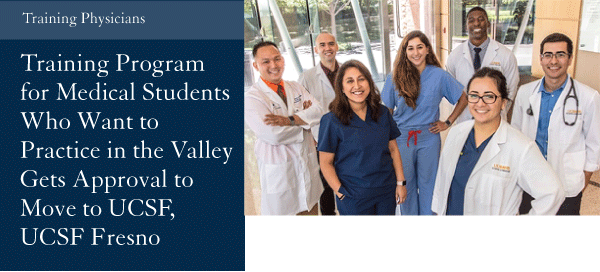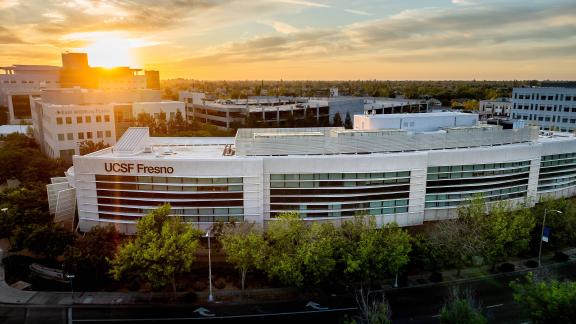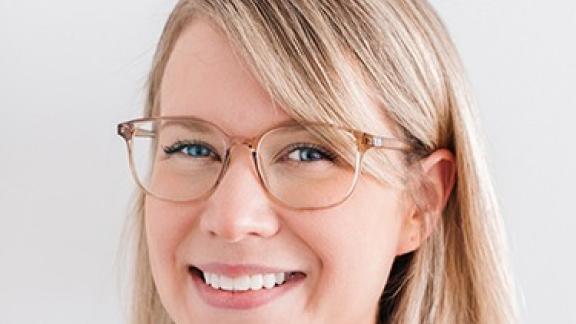

Students enrolled in the San Joaquin Valley Program in Medical Education (SJV PRIME) will now spend more time in the Valley. SJV PRIME is a training program designed to prepare medical students to address the unique health needs of the region’s diverse and underserved populations. The program started in 2011 as a collaboration among UC Merced, UC Davis, UCSF Fresno and UCSF and was previously based at the UC Davis School of Medicine. The national medical school accrediting body, the Liaison Committee on Medical Education (LCME), recently approved the transfer of the program to the UCSF School of Medicine.
UCSF students enrolled in the program will initially spend 18 months at UCSF in San Francisco and then move to Fresno for the remainder of their medical school training. Previously, SJV PRIME medical students spent one year (their third year) in Fresno. Approval to transfer SJV PRIME to UCSF paves the way for a branch campus of the UCSF School of Medicine at UCSF Fresno.
Current funding provides for a class of 12 students per year in the new UCSF SJV PRIME. The initial class starting in 2019 will have 6 students. Future growth of the program will depend on a stable and permanent source of funding and approval by the LCME.
The UC Davis SJV PRIME will continue in parallel for the first-year medical students admitted recently, and who are expected to graduate in 2022. UC Davis also will continue its Rural-PRIME.
A key rationale for the new SJV PRIME is that medical students in the program will be more likely to pursue medical residencies at UCSF Fresno and other regional programs and stay and practice in the Valley if their education is conducted in and focused on the health needs of Valley communities. This likelihood was a key finding of the April 2018 University of California report “Improving Health Care Access in the San Joaquin Valley.”
A health care access summit held at UC Merced in June, sponsored by Assemblymember Adam Gray and featuring UC President Janet Napolitano, discussed the issue of the low ratios of physicians per population, the aging workforce, and crisis of health care access. Establishing a UCSF branch medical school campus by building on the medical education infrastructure that already exists at UCSF Fresno was applauded as a significant step towards the goal of establishing an independent medical school in the San Joaquin Valley.
“The two best predictors of where physicians will practice are where they complete residency training and where they grew up,” said Michael W. Peterson, MD, associate dean at UCSF Fresno. “About 50 percent of physicians who graduate from UCSF Fresno residency and fellowship programs already remain in the Valley to provide care, and we are optimistic that the percentage will increase with the opportunity for more medical students to train locally.”
Established in 1975, each year UCSF Fresno currently trains more than 300 medical residents and fellows along with more than 300 medical students from across the U.S. on a rotating basis. The transfer of SJV PRIME to UCSF will enable students to spend more time training in the Valley and creates a continuum for students to go from medical school to residency training in the region.
Applicants to SJV PRIME will follow the UCSF application process. The first class of UCSF SJV PRIME students will start in 2019.

From First Visit to Diagnosis in Two Days and Surgical Treatment After Two Weeks
When Kristina Alvarez started coughing up blood in April, she knew something was wrong. But after a few doctor visits and a trip to a local emergency room, she still didn’t have a diagnosis. It wasn’t until she was seen at the UCSF Fresno and Community Regional Medical Center Lung Nodule Program that Kristina and her husband Randy had answers.
Kristina was referred to the Lung Nodule Program by her primary care physician. The program relies on a team of specialists to provide a faster diagnosis and treatment for people with lung cancer. Started by UCSF Fresno Associate Dean and pulmonologist Michael Peterson, MD, it is the only program of its kind in central California and one of only a few in the United States.
The Lung Nodule team, under the leadership of medical director Daya Upadhyay, MD, regularly reviews the charts of patients referred to the program to determine the most critical cases. After reviewing her file, Mohamed Fayed, MD, a pulmonary and critical care faculty member at UCSF Fresno, determined Kristina should be seen immediately. He initially suspected pulmonary arteriovenous malformation, which refers to abnormal connections of the veins and arteries in the lungs.
“Kristina’s appeared to be an exceptional case,” Dr. Fayed said. “I knew she had to be seen right away. The key to any diagnosis is meeting with the patient for an overall assessment.”
Kristina saw Dr. Fayed on a Tuesday. He ordered a CT scan that day. Fayed sat with her while she waited for the results to review the images with multiple radiologists. On Thursday, she had a bronchoscopy, which revealed an abnormal area in her right lung that appeared as foreign body. Samples were taken and provided to pathology. On Friday, the diagnosis came – metastatic melanoma.
Metastatic melanoma is when the cancer has spread to other parts of the body and is generally very difficult, if not impossible, to cure. Fortunately, in Kristina’s case, it was an isolated nodule, which is highly uncommon.
Kristina had a history of melanoma. She was first diagnosed (a mole on her back) in 1997. She was diagnosed with melanoma in situ (a stage before actual cancer) in 2015. That time, it was on her left arm.
Kristina was scheduled for surgery two weeks later and the nodule was removed. A few more surgeries were scheduled and then she was started on immunotherapy. She will continue immunotherapy for the next year and possibly a clinical trial to help her immune system fight the cancer. Right now, she is on the mend and recently returned to work.
“We believe what we did was a cure,” said Fayed. “There is no other indication of any other metastasis at this time. Having a team that is committed to the same goal, providing the very best patient care possible, is crucial.”
Kristina is thankful for the care she received and gives credit to the entire team of specialists, including pulmonologist, radiologist, oncologist, pathologist and cardio-thoracic surgeon.
“I am sharing my story because the more people who know about melanoma and lung cancer and the care available locally, the better,” she said. “I have never had someone so involved in my care along the way like Dr. Fayed. Everyone involved really made me feel taken care of.”

Courtesy of Central California Faculty Medical Group
A disaster is defined as any incident in which the number of victims overwhelms the resources of the emergency medical responders. This includes events such as a fire, hurricane, mudslide, terrorist attack or multi-vehicle car accident. Preparing for these disasters is complex, and often takes the cooperation of different agencies and organizations.
In May, UCSF Fresno, in partnership with Sequoia and Kings Canyon National Parks, held their Fifth Annual Mass Casualty Incident Drill, or MCI Drill, near Grant Grove in Kings Canyon National Park.
Stephanie Benjamin, MD, a third-year emergency medicine resident at UCSF Fresno, has been focused on growing the program to better train first responders.
“Training for a Mass Casualty Incident Drill is a lot of work, and requires different organizations to come together and work closely. In the event of a disaster, however, we would need that same level of cooperation to save as many lives as possible. This training allows us to work out the potential hurdles in advance, so when a disaster does strike, we are as prepared as possible,” she said.
The drill included volunteers posing as victims with very real-looking wounds to simulate what an actual disaster would be like.
“Triaging quickly and efficiently is one of the most important components of MCI training. If we can make the disaster appear as real as possible, it allows us to provide an authentic training experience for our first responders,” said Geoff Stroh, MD, clinical professor, emergency medicine, at UCSF Fresno.
This year, more than 100 participants from different agencies participated in the training, which involved a simulated cabin-fire explosion with multiple casualties and severely wounded patients.
Dr. Benjamin only hopes it continues to grow. “Our vision is to create a model that can be duplicated across the country, in different national parks, and eventually develop a comprehensive curriculum that could really improve the way we respond to disasters,” she said.

Air in the San Joaquin Valley, unfortunately, is among the most polluted in the United States. The health impacts of long-term exposure to bad air can be quite serious. Children, in particular, are more susceptible to environmental risks, including air pollution, because they are still developing and take in more oxygen. To understand and reduce the impact of air pollution exposure on children’s health in the Valley, UCSF Fresno is a partner in the Children’s Health & Air Pollution Study (CHAPS). The study also includes pregnant women and birth outcomes.
The research considers children at three important stages, pregnant women and their babies, children and young adults. Information gathered will evaluate the consequences of exposures on birth results, development, and immune health and metabolism. In addition, CHAPS looks at how the built environment in Fresno impacts transportation behaviors and air pollution exposures of pregnant women.
More than 200 women were enrolled in the study when they were pregnant. They brought their infants back at 12 and 24 months of age. More than 300 children were enrolled when they were approximately seven and eight years old to complete one visit and they came back for a second visit two years later (at nine or ten years of age). About 100 adolescents and young adults were enrolled when they were approximately 13 to 23 years old to complete one study visit. All of the adolescent and young adult participants were involved in the previous CHAPS investigation, the Fresno Asthmatic Children’s Environment Study, which was conducted from 2000 to 2008.
All study visits take place at the UCSF Fresno Clinical Research Center inside the UCSF Fresno Center for Medical Education and Research in downtown Fresno. Most study participants will be seen two to three times. During the visits, UCSF Fresno research staff members collect information from the subject or their parent about their health, environment and home exposures, activity levels, and nutrition. The infants have a physical assessment completed, including blood draw and measurements for length/height, weight and head and waist circumferences. Children also have a blood draw, height and weight measurements, blood pressure, and a lung function test or spirometry.
Hospital admissions and emergency room visits linked to asthma and other respiratory illnesses, increased cardiovascular disease risks and even premature death are just some of the health impacts associated with the Valley’s polluted air.
The goal of the multi-year CHAPS investigation is to understand and reduce the impact of air pollution on children’s health and to develop partnerships with community organizations that prioritize air quality, environment and health. The study is a partnership among UC Berkeley, Stanford, Sonoma Technology, Fresno State and UCSF Fresno and is funded by the National Institute of Environmental Health Sciences.

Gifts of Good Health
Thanks to the following for their support of UCSF Fresno and improved health in the San Joaquin Valley:
- American Ambulance donated a critical-care ambulance from its fleet to UCSF Fresno to be used for mobile health and learning in the San Joaquin Valley, especially in communities with limited access to health care.
- Friends and family gave nearly $9,000 in memory of Todd Hendrickson to establish the Todd Hendrickson Pancreatic Cancer Research Fund to support research associated with pancreatic disease at UCSF Fresno.
To support UCSF Fresno’s mission of improving health in the San Joaquin Valley through teaching, patient care, research and community partnerships, email [email protected], go to http://www.fresno.ucsf.edu/give/ or call (559) 499-6425.





